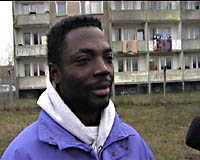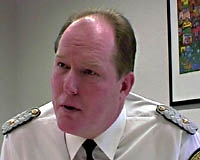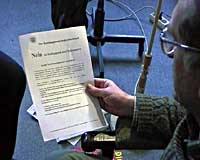 - Who’s allowed to migrate?
- Who’s allowed to migrate?
THE
VOICE fights the residency requirement which says that asylum seekers are
only allowed to leave their administrative district with an “entitlement
certificate”.
Cottbus,
Brandenburg
Jean
Jacques Effson Effa (Activist of the self-organized refugee organization
THE
VOICE:

This
year in that congress in Jena the decision was made to fight against this
Residenzpflicht, the Landkreis, what means, you need a permission if you
want to go for example to Berlin. And the fight is against that law. Because
it is very difficult for us to meet because of that law. If I go to the
Ausländerbehörde and I say I need a Urlaubsschein to go to Jena
to a meeting of THE VOICE then it is a problem. So most of the time I have
to travel without Urlaubsschein. I say ok., if they catch me maybe one
day I will be in prison because I wanted to be free. That’s what is in
my head. That means, I cannot live in a Landkreis in my head because Landkreis
is not only physical. They want to create it even in our mind. And in my
mind I was born free. And I think when I am in Germany, I am in a free
country, and I have to move free. Ok., the police will control me one day,
I will go to prison, even if I will be in the prison I will still be free
in my mind.
In Germany
we are not allowed to go to school, to study German. We don’t have any
German courses, we don’t get money to pay them. So we are excluded from
the society. It is the best way to keep us outside because they want to
keep us outside. They don’t want any contact. They don’t want us to have
any contact with Germans. When we don’t speak the language, that is a good
way to keep us outside. And is also the good way to show at us with the
finger and say that those people are criminal. Because we cannot communicate
with them, we cannot explain why we are here and nobody understands us.
They cannot understand our culture because we don’t speak their language,
it is quite difficult. A lot of Germans don’t know that I’m not allowed
to work because they are saying that we are here to take their jobs and
things like that. They don’t know that we are not allowed to work. They
don’t know that. I’m not allowed to leave my Landkreis. They don’t know
that I have only 80 Marks every month as cash-money. They don’t know that.
They think we got a lot of money. And because we don’t speak German it
is very difficult for us to explain them that here in Germany we are not
living in a palace, we are living in a open prison.
Vienna,
Danube Canal
Grace
Latigo (artist, political activist):

When
I “slipped into illegality” , it wasn’t really clear to me for two years,
I couldn’t believe it. But suddenly you start to feel it because you can’t
get any work, because you can’t get a work permit, and so on and so forth.
Then you get ideas, you want to stay current, you are progressive, full
of energy; but you can’t move on because you aren’t legal. You can’t do
it, you can’t do anything. And then you think, there is a political system,
I want to speak up.
I
want to say something. But you have no vote, you have no say in the matter.
And then at some point you ask yourself the question: what am I? You come
to the pathetic conclusion: nothing. Third class human/woman. Then you
think, but I want to go further, I don’t want to be stopped constantly
by these stupid laws. And then complications arise. You get a bit of help
here and a bit of help there. I don’t look like a victim. At one point
I quite cynically called myself a “privileged illegal”.
Inside,
though, I am broken. Broken inside means that you can no longer reach your
goals. You can’t carry out your work. You can’t realize your ideas and
visions. In the end I found a way to do that but still, I have never received
the recognition which I deserve, which would only be fair, and above all,
I’ve been denied the respect. That means that you always have some kind
of FALSE IDENTIFICATION. Yes, and then at some point I started to get sad
and depressed. But I didn’t want to fall into it and instead got extremely
angry. I am angry with you. I am extremely angry with all of you because
this system, these laws are the reason that I don’t have my rights, why
I can’t live my life – which wouldn’t harm anyone. My human/woman rights,
I am entitled to them!
And
at some point I was invited to a discussion organized by a group called
“No one is illegal” which was still at the time also run by the Evangelical
diocese. Suddenly someone from this diocese said to me, “we will speak
for you.” I was sitting there and I thought, “you don’t have to speak for
me, I can speak for myself, but you simply don’t let me speak.” So I stood
up and said, “Good evening, my name is Grace Latigo and I can speak for
myself! I have been illegal for seven years.” Naturally that set off a
huge chaos and I had to explain to the people why it was important that
they let me speak. So first I did it for myself, but when I make my case
public then I am thinking of others who are affected, as I can better relate
to their position. I also don’t demand that everyone is able to understand
my position. I am just asking for respect of these people’s situation,
and the insight, the humanity necessary to comprehend what it means to
suddenly become a third class human/woman. A few clear thinkers – above
all women – understood. They also explained to me that they could understand
it logically although it was difficult for them to empathize. They supported
me. Then a campaign was formed and I actually got my visa within a week,
my brother as well. And in a perverse way I can thank the media and the
pressure; it was actually an interesting case. Has the situation for these
“gray zone human/women”, – human/women, I like that expression best – changed
or not? Well, I don’t think so. I have constantly addressed it politically
and called for the immediate legalization of people who have lived in Austria
– in some cases for twenty years – who have fallen into living without
documents, this odd situation of so-called illegality. But nothing has
been done about it.
Another
extremely important point is: how deeply have you really confronted racism
and discrimination, you. It isn’t so simple. It is like history. Just like
you have to learn the history of World War II, you have to learn the history
of this murderous ideology of racism.
 - On border crossing services
- On border crossing services
Bodo
Kaping (federal border patrol office, Frankfurt/Oder):

Yes.
My name is Bodo Kaping, I am 42 years old and run the target area operation
of the federal border patrol office, Frankfurt/Oder.
Krenn/Ressler:
Can you explain the difference between traffickers, smugglers and “Fluchthelfer”
(a positive term for people who provide border crossing services)?
Bodo
Kaping: For me there isn’t much difference. They are people who capitalize
on the misery of other people. They earn money by violating laws, by offering
help, knowing consciously the fact that they are irresponsibly putting
the lives and health of the people at stake. And the profit margin sought
in the area of trafficking is comparably as high as in the drug trade;
only here it is about people being brought across the border through criminal
means.
We
speak of trafficking, about traffickers and those who have been trafficked.
That is the way we talk. Smuggler is a term that is constantly used but
it has no place in our way of talking about things.
And
in our current use of the language, we don’t speak about “Fluchthelfer”.
When we look back in history, it is actually something quite different
– the concept has a POSITIVE CONNOTATION. They were, namely, those who
at the time of the “iron curtain” brought people from the East to the West.
K/R:
There are, however, a lot of people who help their relatives make illegal
border crossings. So in your language usage they are also traffickers?
Bodo Kaping:
Definitely. They are committing a crime.
K/R: But they
are not hostile to human beings – they are bringing over their own relatives...
Bodo Kaping: It
isn’t our job to judge that.
K/R: But you
are making judgements. For example, there is a leaflet from the BGS with
the title: “Attention Traffickers!” and then it says: “your information
helps to catch the perpetrators and put a stop to traffickers hostile to
human beings.”
Bodo Kaping:
I already stated it previously. Whoever tries to violate the law in the
Federal Republic of Germany must reckon with being punished.
You have to understand,
inhumanity has something to do with it: human lives are brought into danger.
As I said, the rivers, Oder and Neisse, characterize this border. The Neisse
is not a great obstacle most months of the year, just a trickling stream,
often dry. But there are months in spring, in autumn, when this stream
becomes a larger river, even a dangerous river!
And those who bring
people across at the dead of night act inhumanely because they bring them
into a danger that they can’t assess. There is, then, for whatever motives,
always an aspect somewhere that brings the life and limb of people in danger.
And there is something hostile to human beings about it.
K/R: But with
this argument those who helped people escape from the former German Democratic
Republic were equally hostile to human beings because they also put refugees
in danger.
Bodo Kaping:
I don’t want to comment on that matter now.
Since
the beginning of 1997, in Germany, taxi drivers have been given prison
sentences, some for several years, for transporting people without papers.
Berlin,
Taxistas
Hans
Heim (Taxi driver, Taxistas-Activist, Berlin):

My
name is Hans, I drive a taxi with a small taxi collective in Kreuzberg
in Berlin. I think the collective has been around for fifteen or twenty
years. I haven’t been with them that long, only for six or seven years.
The
BGS, the federal border patrol, ordered the taxi drivers to cooperate.
They are supposed to inform the BGS if they pick up customers whom they
suspect have crossed the border illegally.
Then
there is the request: “don’t let yourself be misused by smugglers.” Okay,
sure, the federal border patrol says that it fights smugglers. It says
it isn’t fighting the refugees but naturally in actual practice it does
fight against the refugees since, first of all, it is the refugees who
are captured. Maybe someone is there who has brought the people over the
border, professionally, or for money. But even if that person is not there,
the refugees are captured, they are deported and interrogated, etc..
This
whole language thing with these “covert smuggling rings” distorts reality.
And this formulation: “Do not take any person in your taxi who has obviously
entered the country illegally.” There was this huge discussion after that,
sure, what is a “person who has obviously entered illegally?” The taxi
driver is not allowed at all to check personal data. He isn’t an official.
He is not even allowed to ask for an ID. So actually, he can’t really know
if someone has entered illegally or not. How can it be noticed? In court
there were statements such as: “sure, by the clothing, by the wet clothes.
You must notice that people have marched across the mountains or something.”
Okay, fine, what if I told you about all of the different types of people
that I have taken with me here in the middle of Berlin? everything that
I could have imagined about where they come from, what they’ve done; whether
one of them robbed a bank or if the other crawled out of the water because
he had almost drowned? Once I transported someone who was bleeding like
a pig, how do I know where he came from? I don’t think about it. As taxi
drivers we aren’t hailed to think about why that person gets into the taxi
in the condition they do. That is also an unreasonable demand on us as
taxi drivers.
Sure,
and then it continues: “Inform us or any other police department of any
attempts to recruit you or if you observe anything else. If desired, this
can also be done confidentially.” Okay, that is now a clear request for
what is basically unlimited denunciation. It applies to everyone who looks
different in any way, whether they have a German passport or not. They
should be reported to the police and we should set the cops on their tail.
Really though, that goes beyond what we can describe as decent and acceptable.
But it is reality.
Taxi
drivers, for example, might be approached about transporting a customer
to Zirndorf. That is the Federal Republic’s official reception office for
asylum seekers. Okay, and if I transport someone to Zirndorf, that is a
long stretch for a taxi driver, and I would collect about 2 Marks per kilometer
and that is quite a nice wad of money. But okay, they pay in order to get
there.
But
if I do that now, then suddenly I am a covert smuggler, although I simply
want to help a refugee to his basic rights of asylum that German law has
granted him. I am already a smuggler. That can’t really be true; but it
is.
Okay,
here they write about the consequences, practically prophesizing something
which back then was not even yet reality: “Assisting illegal border crossings
carries the following consequences: prison sentence or fine, possible confiscation
of the automobile or revocation of the taxi license.” Meanwhile, all three
consequences have been consistently enforced. The paragraph that they refer
to is the one on covert smuggling rings. And you are then, as a taxi driver,
a member of a smuggling ring and sent up for one to ten years. That is
a serious crime that you are involved in if you don’t adequately observe
these atrocious laws. |